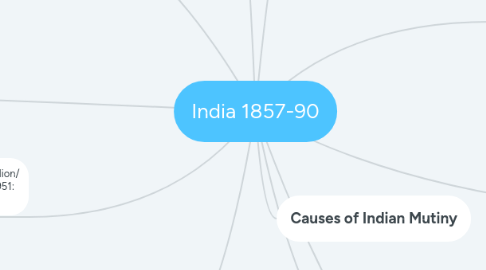India 1857-90
von Laura Platt

1. Population size of India: 1850: 200 million/ 1901: 236 million / 1921: 251 million/ 1951: 261 million
2. Bckgrnd Info
2.1. EIC: cloths/spices. Royal Charter 1600
2.2. From 1757 w/ own armies: sepoys- military power/admin functions >maximise profit took large areas of land
2.3. 1818: new source income- land taxes > Indians used to pay to Indian rulers.
2.4. 1840's-50's Gov Gen of India Lord Dalhousie> Doctrine of Lapse- acquire territory. If Indian ruler died w/o heir Br could take territory.
3. Religion
3.1. Differences: Hinduism- religious majority
3.2. 20% Muslim
3.3. Other religions: Seikh, Catholicism- in areas of Br rule- missionaries
4. Events of the Mutiny
4.1. 3 months for BR troops restore Delhi > 40,000 revolted
4.2. Struggle for Lucknow lasted 12 months > 60,000 mutinied
4.3. Bitter struggle Cawnpore- 1000 Br citizens starved into submission. When Br arrived Sepoys refused to surrender but threw dead women over the walls > Br crushed the revolt. Sepoys forced to lick the blood then hanged
4.4. Br finally defeated the mutiny in June 1858. Reprisals appalling- executions w/o trial/bitterness. 8/7/58 peace treaty signed rebellion ended
5. Impact/ Consequences of the Mutiny
5.1. 100,000 Indians had been killed in uprising
5.2. Army of retribution: justified by atrocities, as well as hanging bkew some fro cannon (Mughal traditiion), 'no prisoners' approach
5.3. Br press exaggerated killings/wounded which were much higher on Indian side.
5.4. Last Mughal emperor tried for treason executed 1862.
5.5. Restricted Indian entry into the ICS
5.6. End og the EIC> Crown. EIC land became part of the crown >1858 Gov of India Act
6. Military
6.1. 1/ Br ended extra Sepoy pay for fighting abroad- Bhatta> need for purification
6.2. 2/ Sepoy pay and condiitons dramatically lower than Br - increased differences/ disrespectful to Sepoys- divide
6.3. 3/ Br losses in Afghan War of EIC affected morale of Sepoys
6.4. 4/ More sepoys needed as EIC army sent abroad- Opium Wars/Crimea/Afghan etc
6.5. 5/ Increased intensions within army- Bengal army felt unwanted on arrival- lower castes
7. Religious
7.1. 1/ Br ignored religious customs/ traditions : Hindu purification (left country- unclean- lots of money to purify)
7.2. 2/ Omen's rumour: Br troops weakened in Crimea- superiooty over- 100 years since Battle of Plassey- prophesy Br rule would end in 1857
7.3. 3/ Lee Enfield Rifle: bite into catridges with pig fat> against Hindu/Muslim religion- unclean
8. Political
8.1. 1/ Lord Dalhousie: Doctrine of Lapse-lack of heir- Br would take over that land
8.2. 2/ Policy of Westernisation: B and D enforced culture- legal system-religion upon the Indians
9. Social
9.1. 1/ Br officers became more dismissive- trust was lost between Indians and Br. Increased intolerance/ lack of involvement/concern. Leaders were replaced w/ arrogant rulers.
9.2. 2/ Br offended Bengali army by recruiting others outside the Hindu caste system (Ghurkas/sikhs)- increased distrust
9.3. 3/ Ban of Sutee by Bentinck - widowed women byrnt alive on funeral- not allowed to remarry- tradiiton
9.4. 4/ Ended child infanticide- killed girls made illegal- tradition
10. Economics:
10.1. 1/ Punitive tax system: Harsher than in Br- peasants expected to pay- kept them impoverished
10.2. 2/ Br purposefully destroyed industrialisation opportunities- EIC employees destroyed looms- ensure theu were dependent/ couldn't compete w/ Br- impoverished
10.3. 3/ Lord Bentinck resumptiion of tax free lands caused resentment among middle class/aristocrats
11. Causes of Indian Mutiny


